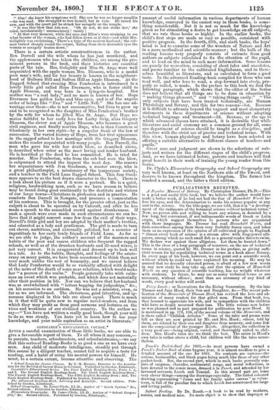CONSTABLE'S EDUCATIONAL COURSE. * AFTER a careful examination of these little
books, we are able to give a favourable report of them. To all whom it may concern,— to parents, teachers, schoolmasters, and schoolmistresses,—we say that this series of Reading-Books is as good a one as we have ever seen. Any child of moderate intelligence, steadily put through this course by a diligent teacher, cannot fail to acquire a taste for reading, ands habit of using his mental powers for himself. He must, to a certain extent, become attentive and observing. The • School Songs for Junior Classes. By T. M. Hunter, Director to the Associa- tion for the Revival of Sacred Music in Scotland. Published by Gordon, Edinburgh. Constable's Educational Series. The First English Reading-Book, Parts 1, 2, and 3. The Second English Reading-Book. The Third English Reading-Book. The Fourth English Reading-Book. The Fifth English Reading-Book ; and, The Sixth English Reading-Book. Published by Gordon, Edinburgh. The Advanced Beading-Book, Literary and Scientific. Second edition. Pub- lished by Gordon, Edinburgh. School Geography. By James Clyde, LL.D., Author of " Greek Syntax," &c, Second edition. Published by Gordon, Edinburgh. Elementary Geography, By James Clyde, LLD., Author of " School Geogra- phy," 8w. Second edition. Published by Gordon, Edinburgh., amount of useful information in various departments of human knowledge, conveyed in the easiest way in these books, is some- thing considerable. But it is not so much for the knowledge given as for stimulating a desire to get knowledge on ail Subjects, that we rate these books so highly. In the earlier books, the child's first steps are made as easy as possible, consistent with positive progress. In the fourth, fifth, and sixth books, the boys' mind is led to examine some of the wonders of Nature and Art in a more methodical and scientific manner ; but the bulk of the reading lessons very properly consists of extracts from good authors on subjects calculated to fix the attention of the pupil, and to lead on the mind to seek more information. Some lessons are purely for recreation, consisting of short tales and anecdotes, and poems familiar to the cultivated Englishman, and in them- selves beautiful as literature, and so calculated to form a good taste. In the advanced Reading-book compiled for those who can read well, and who love to read, a step forward into study,pro- perly so called, is made. In the preface to this book we find the following paragraph, which shows that the editor of the Series does not believe that all things are to be done in education by " making things pleasant," and " taking things easily." " The only subjects that have been treated technically, are Human Physiology and Botany, and this for two reasons-1st. Because it is difficult to advance beyond the vaguest and most elementary statements in these departments of science without adopting technical language and treatment-2d. Because, at the age to which advanced classes have attained, it is desirable that while literature and social economy are a common ground for all, some one department of science should be taught as a discipline' and therefore with the strict use of precise and technical terms. With this view, human physiology and botany have been selected as offering a suitable alternative to different classes of teachers and pupils."
Great care and judgment are shown in the selections of sub- jects and writers for the different stages of the child's progress. And, as we have intimated before, parents and teachers will find great benefit in their work of training the young reader from this Series.
Dr. Clyde's Elementary Geography and School Geography are very well known, at least on the Northern side of the Tweed, and deserve to be known throughout the kingdom. The former has reached a second, and the latter a third edition.


























 Previous page
Previous page